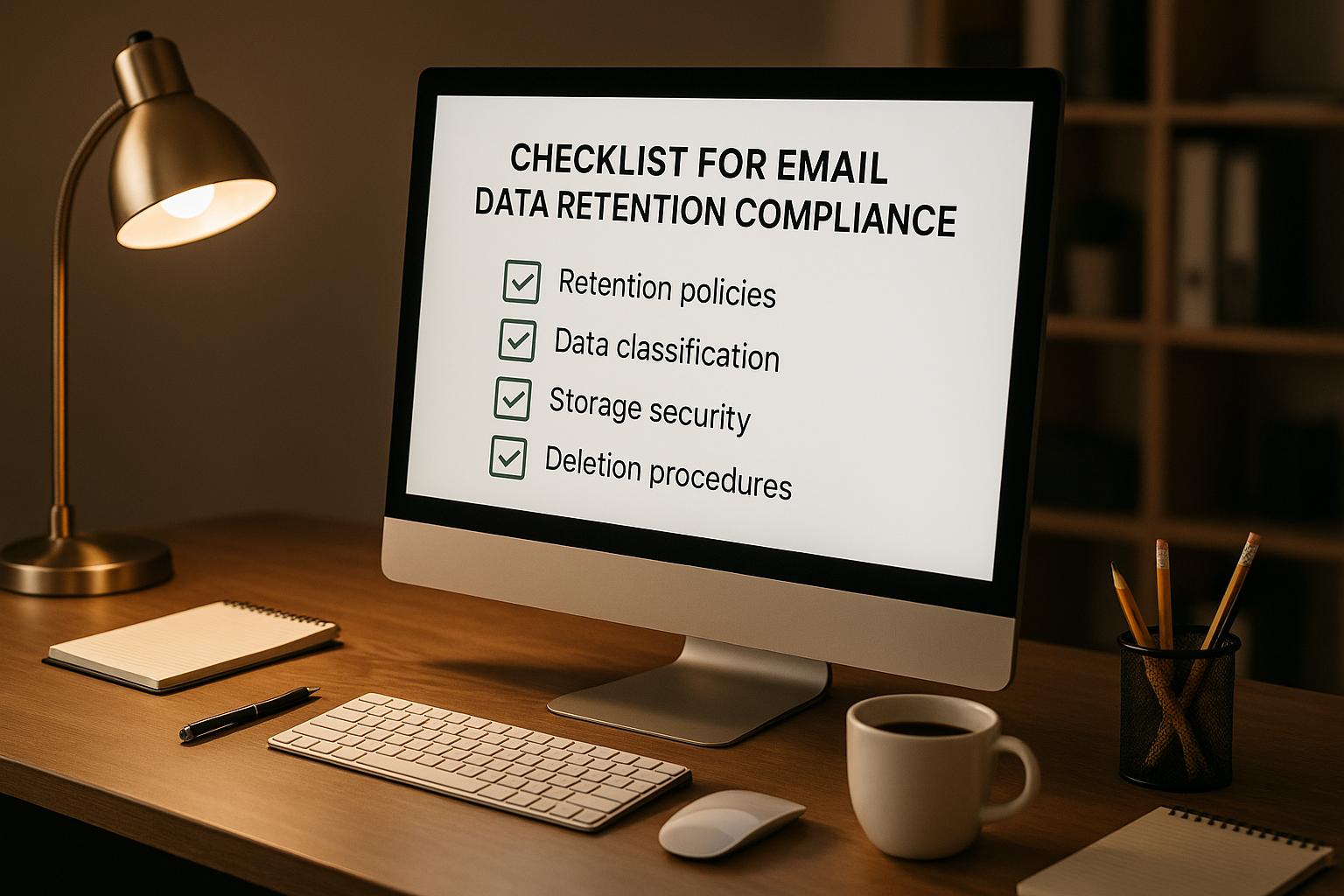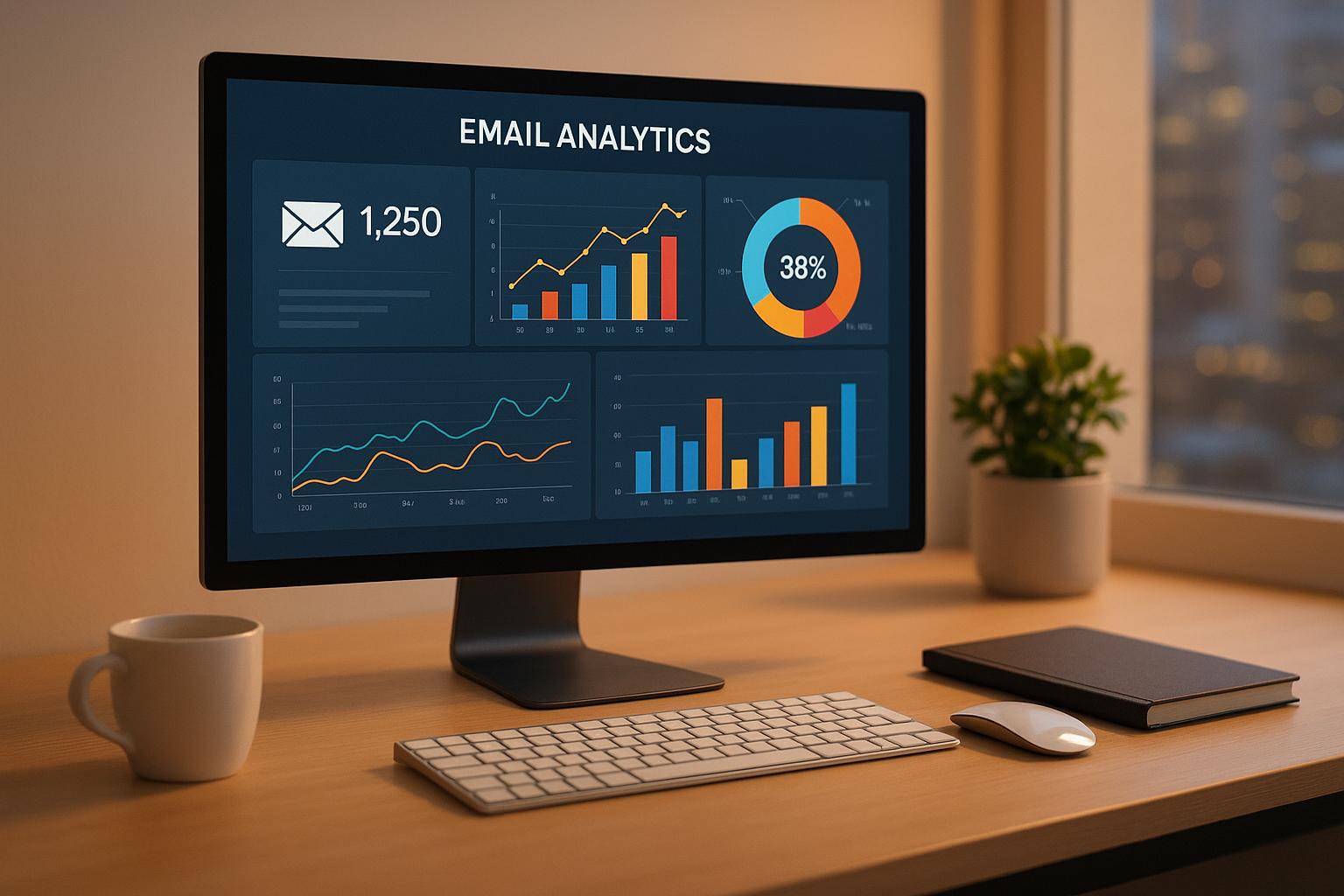Looking for the best enterprise email marketing platform? Here's a quick rundown of the top 5 options:
- HubSpot Enterprise: User-friendly with strong CRM integration
- Salesforce Marketing Cloud: AI-powered personalization and multi-channel campaigns
- Adobe Campaign: Advanced cross-channel marketing and segmentation
- Oracle Eloqua: Sophisticated lead scoring and deep CRM integration
- Email Service Business Directory: Flexible access to multiple tools and resources
Quick Comparison:
| Platform | Ease of Use | CRM Integration | AI Features | Pricing |
|---|---|---|---|---|
| HubSpot | Easy | Strong | Basic | Starts at $3,600/month |
| Salesforce | Complex | Excellent | Advanced | Custom |
| Adobe | Difficult | Good | Advanced | Custom |
| Eloqua | Moderate | Excellent | Advanced | Starts at $2,000/month |
| Email Directory | Varies | Varies | Varies | $299-$2,999/month |
Choose based on your budget, scalability needs, integration requirements, and specific marketing goals. Each platform has strengths and weaknesses, so pick the one that best fits your company's needs.
Related video from YouTube
1. HubSpot Enterprise
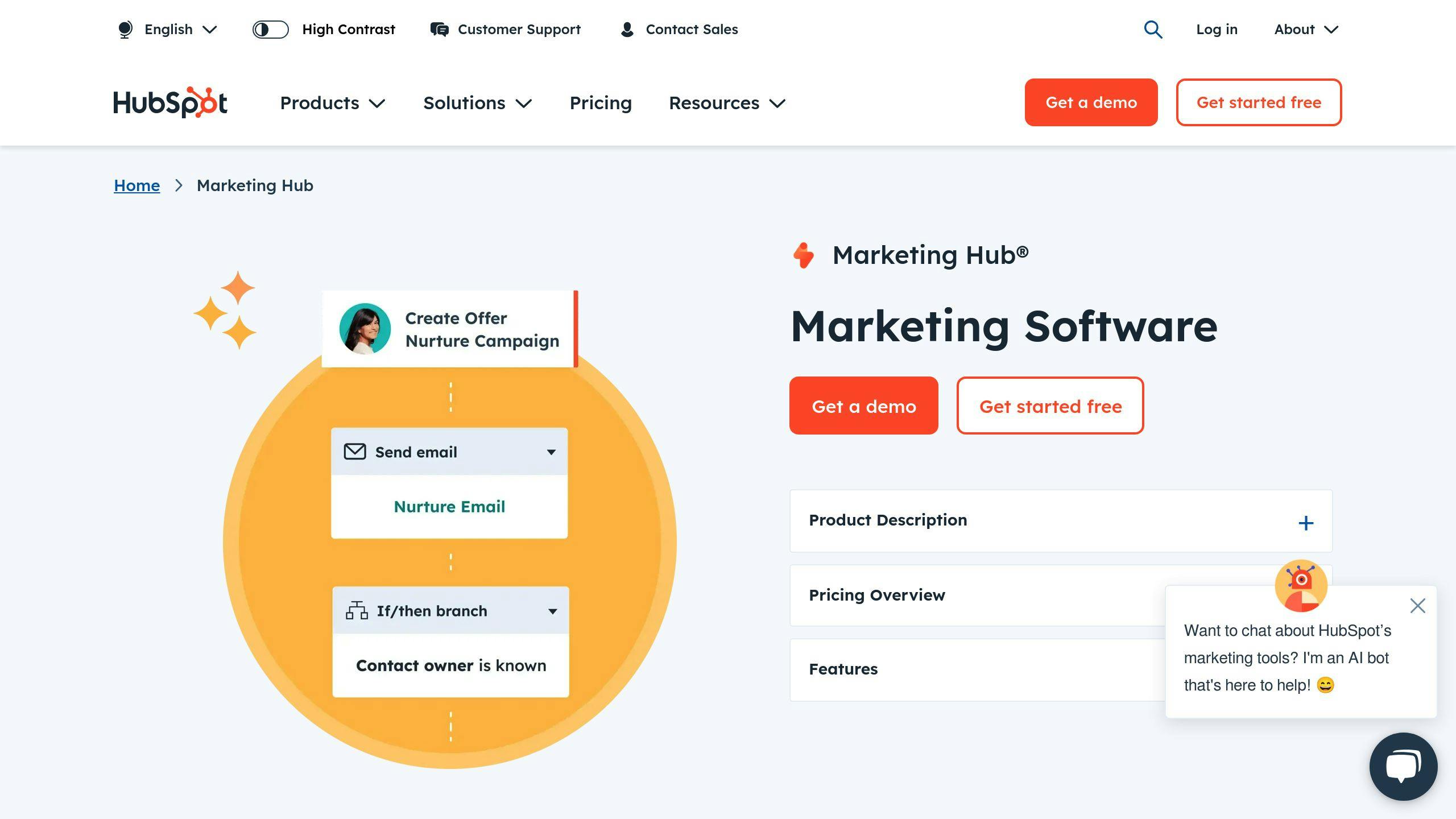
HubSpot Enterprise isn't just an email tool. It's a full-blown marketing and sales platform with CRM, lead nurturing, analytics, and customer service features. Let's break it down:
Marketing Automation
HubSpot's Marketing Hub covers the entire customer journey:
- Drag-and-drop email editor
- AI-powered lead scoring
- CMS that plays nice with marketing tools
- Built-in SEO tips and content strategy tools
CRM Integration
HubSpot's CRM and marketing tools work together like peanut butter and jelly:
- Real-time updates every 10 minutes
- Auto-logs all client chats
- Pings your sales team when leads visit your site
Pricing
HubSpot Enterprise is built for big players:
- Starts at $3,600 per month
- 10,000 marketing contacts included
- 5 user seats
- One-time $7,000 onboarding fee
What do you get? Advanced features like:
- 1,000 workflows for complex automation
- A/B testing for emails and landing pages
- Multi-touch revenue attribution
Real-World Use
HubSpot's got 216,840 customers in over 135 countries. Users love how easy it is to use.
One happy customer said:
"Our business relies on the HubSpot platform to manage our marketing, sales and CRM processes. HubSpot marketing automation helps us define our activities and streamlines them in a cohesive and efficient way."
How It Compares
Here's how HubSpot stacks up against Salesforce Marketing Cloud:
| Feature | HubSpot | Salesforce Marketing Cloud |
|---|---|---|
| Email Marketing | Drag-and-drop editor, A/B testing | Advanced personalization, predictive content |
| Lead Scoring | AI-powered scoring | Einstein AI scoring, predictive lead scoring |
| Customer Journey Mapping | Basic workflow tools | Advanced Journey Builder with multi-channel support |
| Segmentation | List segmentation, basic behavioral targeting | AI-powered segmentation, predictive audiences |
| Integration | Wide range of native integrations | Seamless integration within Salesforce ecosystem |
Salesforce might have fancier features, but HubSpot's user-friendly interface makes it a strong contender.
Is It Right for You?
HubSpot Enterprise works best for businesses that:
- Want a powerful yet easy-to-use platform
- Need marketing, sales, and service to work together smoothly
- Focus on content marketing and lead nurturing
- Value real-time updates and automated tasks
But watch out: HubSpot's pricing is based on contacts. As your database grows, so does your bill. For some big companies, this could be a deal-breaker when comparing options.
2. Salesforce Marketing Cloud
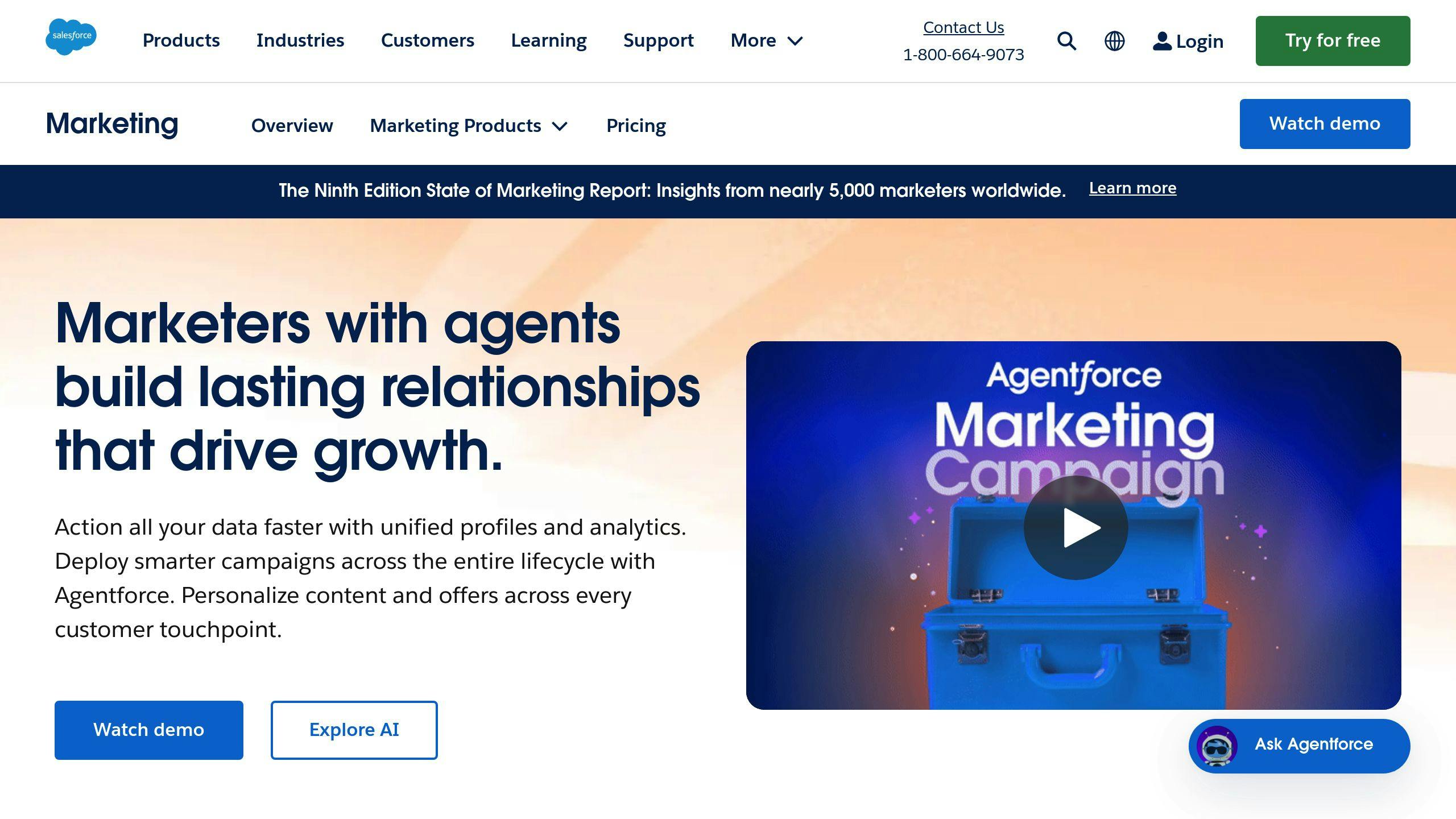
Salesforce Marketing Cloud is a beast. It's built for big companies that need to run complex marketing campaigns across multiple channels.
What's cool about it?
- Journey Builder: Map out personalized customer journeys
- Email Studio: Create and automate email campaigns
- Audience Studio: Organize customer data for targeting
- Einstein AI: Use AI for smart analytics and content tweaks
The best part? It plays nice with other Salesforce products. This means your sales, service, and marketing teams can all work from the same playbook.
Real-world example:
A phone company hooked up Salesforce Service Cloud with Marketing Cloud. When a customer asked for help, they got personalized text updates and follow-up emails automatically. Customers loved it.
How much does it cost?
| Plan | Price | What you get |
|---|---|---|
| Basic | $400/month | Email marketing, content tools, Sales Cloud connection |
| Pro | $1,250/month | Marketing automation for emails |
| Corporate | $3,750/month | Tools for multiple channels, including mobile and customer journeys |
| Enterprise | Call for pricing | Multi-channel campaigns for big companies |
It's not cheap, but for big companies, it can be worth every penny.
What do users think?
Rilwan, a product designer, gives it 4 out of 5 stars:
"If you can answer these questions and you feel like, 'Okay, we have the funds to actually get this software to implement into our business, and this can actually scale our business from where we're trying to get to,' then I would actually recommend using Salesforce because you would not be disappointed."
How does it stack up against HubSpot?
Both are solid, but Salesforce Marketing Cloud is better for bigger companies with complex needs. It's got fancy features like SQL and relational data modeling for super-specific targeting. HubSpot is more for small to medium-sized businesses and is easier to use.
Is it right for you?
Salesforce Marketing Cloud is great if you:
- Need to run big, multi-channel marketing campaigns
- Want to connect it with your CRM and other business tools
- Have the money and people to handle a powerful (but complex) marketing platform
- Care about advanced analytics and AI insights
But if you're a smaller company or want something simpler, it might be overkill. Think hard about what you need, what tech skills you have, and how much you can spend before you jump in.
3. Adobe Campaign
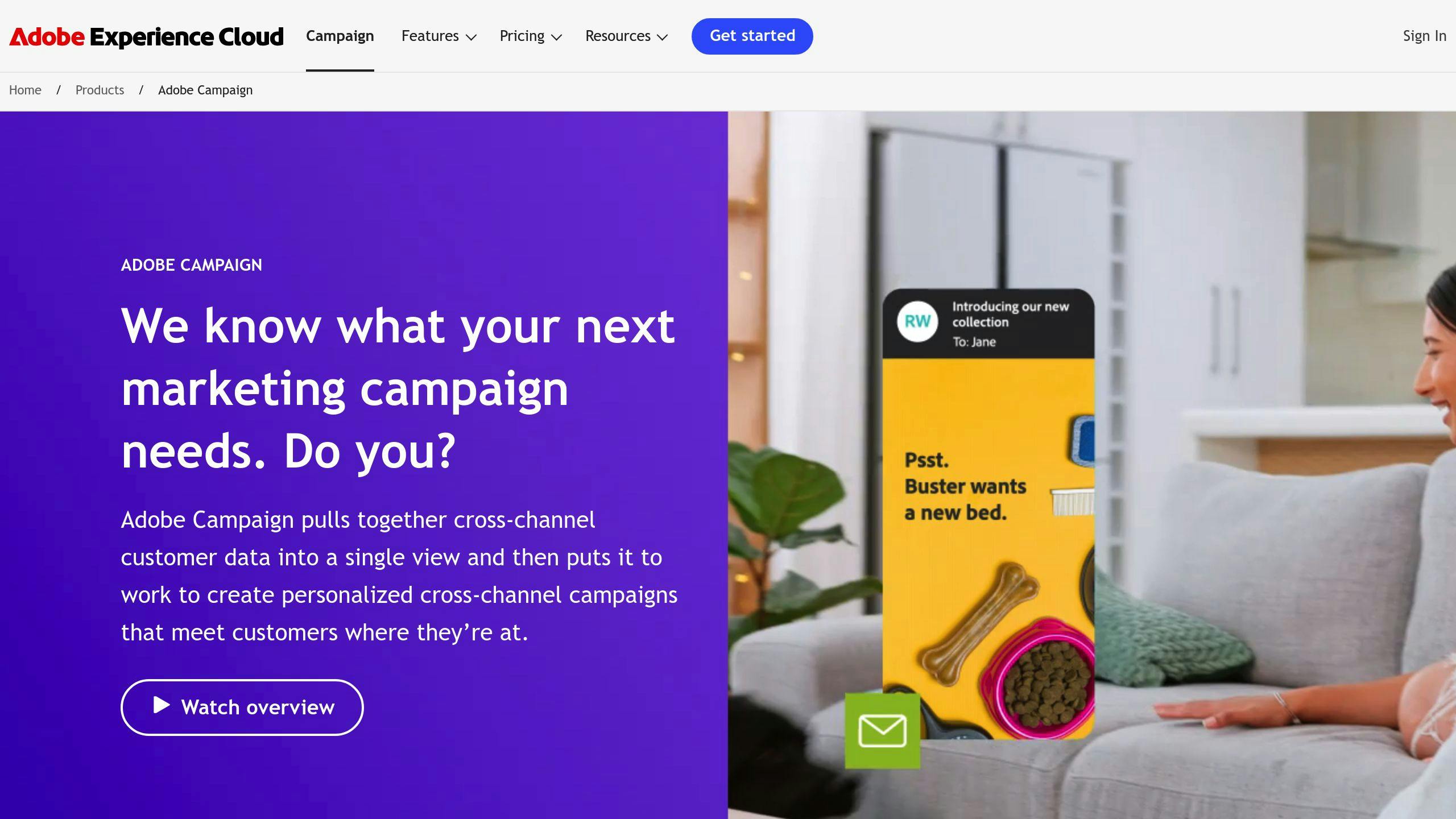
Adobe Campaign is a heavyweight in enterprise email marketing. It packs a punch with tools for creating personalized, data-driven campaigns. Here's what makes it tick:
Key Features
Adobe Campaign's AI-powered features are its secret sauce:
- It figures out the best time to send emails to each subscriber
- It automatically creates targeted audience segments
- It manages campaigns across email, SMS, push notifications, and web channels from one place
Real-World Use
Users across industries have good things to say:
"Adobe Campaign is critical for sending personalized email campaigns to all our customers. It offers send time optimization and A/B testing for multiple subject lines, email templates, and content blocks." - Healthcare Industry Reviewer
This shows how good the platform is at personalization and testing - big deals in enterprise email marketing.
Pricing and Plans
Adobe keeps its pricing under wraps, which tells us:
- It's probably not cheap
- They're aiming for big businesses with custom needs
- Prices likely depend on how many contacts you have and what features you want
Playing Well with Others
Adobe Campaign is a team player:
- It works smoothly with other Adobe Experience Cloud products
- It can connect to big databases and CRM systems like Microsoft Dynamics 365
- It's recently upgraded its security for connecting to other systems
The Good and The Not-So-Good
| Pros | Cons |
|---|---|
| Smart AI features | Takes time to learn |
| Lots of customization options | Interface can be tricky |
| Good at multi-channel marketing | Might be pricey |
| Works well with other Adobe tools | No public pricing info |
Is Adobe Campaign Your Match?
Think about Adobe Campaign if:
- You're a big company with complex marketing needs
- You're already using other Adobe products
- You have the resources for a powerful but complex platform
But be ready to invest time in learning how to use it. As one user put it:
"Users are advised to undergo at least one training session to effectively utilize Adobe Campaign due to its complexity."
Compared to HubSpot and Salesforce, Adobe Campaign offers more advanced features and customization. But it's harder to learn. It's a great fit for businesses that use other Adobe products and need sophisticated, data-driven marketing across multiple channels.
sbb-itb-6e7333f
4. Oracle Eloqua
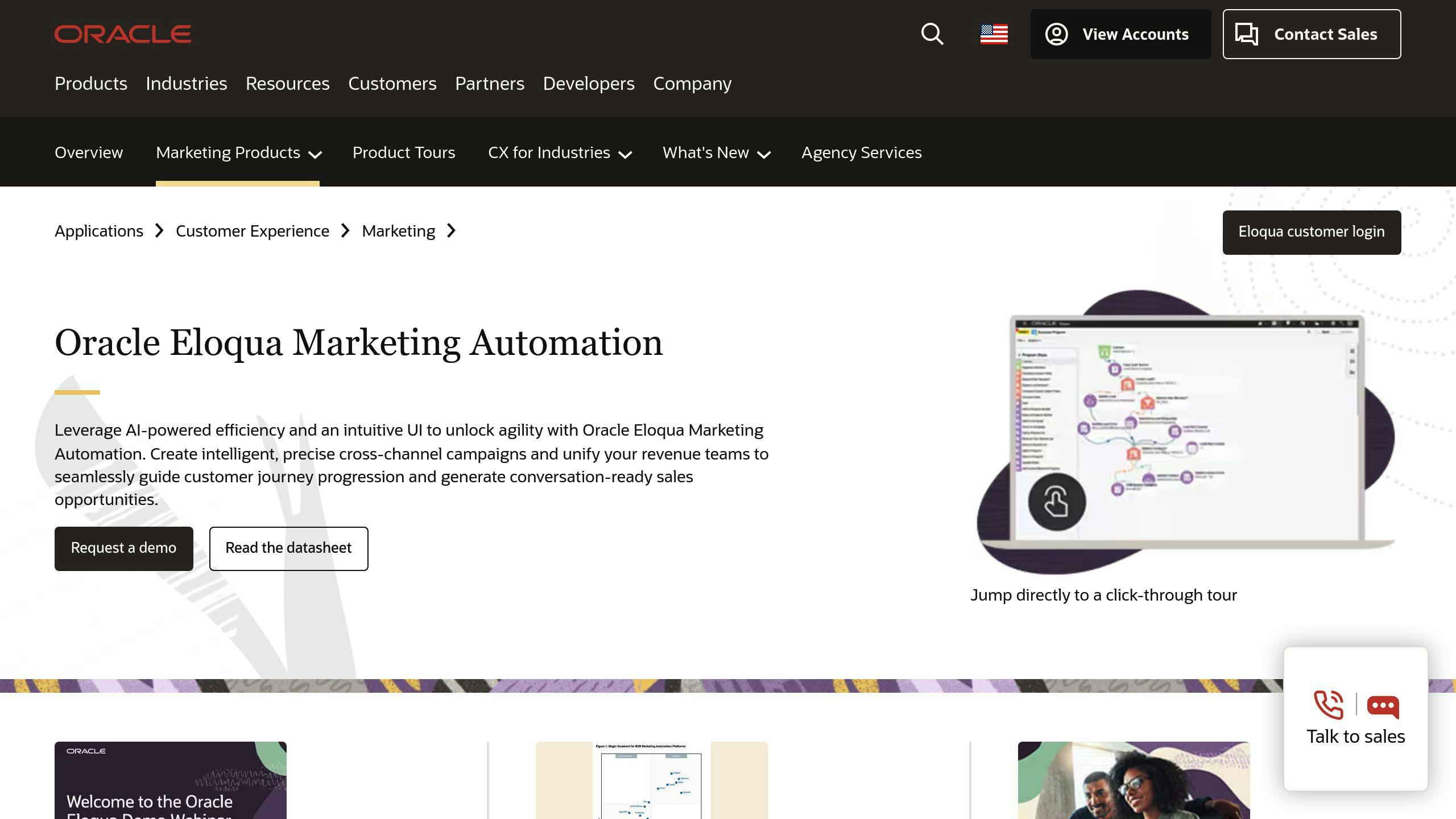
Oracle Eloqua is a big player in enterprise email marketing. It's built for large companies with complex marketing needs. Let's break it down:
Key Features
Eloqua's strength? Advanced segmentation and targeting. Its Segment Designer lets you slice your audience with precision. Want to target tech CEOs who opened your last three emails? No problem.
The Campaign Canvas is where things get interesting. It's like a playground for marketers. You can create complex, multi-channel campaigns that react to customer behavior in real-time. Picture this: an email campaign that follows up with a personalized social media ad, then triggers a sales call if the lead shows high interest. That's Eloqua's wheelhouse.
Real-World Use
Eloqua plays well with others:
"An integrated ecosystem can help you: Understand your customers better, making it easier to create personalized and engaging campaigns." - Grazitti Team
This integration shines in practice. When paired with Salesforce, Eloqua breaks down info silos. Marketing can give sales detailed prospect info, creating a smooth handoff between teams.
Pricing
Eloqua's pricing isn't cheap:
| Plan | Price | What You Get |
|---|---|---|
| Basic | $2,000/month | Entry-level features |
| Standard | $4,000/month | More advanced capabilities |
| Enterprise | Custom pricing | Full suite of features |
There's also a $2,000 setup fee. It's a big investment, but for large companies, it can pay off.
How It Compares
Eloqua is more complex than HubSpot but offers more advanced features:
| Feature | HubSpot | Oracle Eloqua |
|---|---|---|
| Email Marketing | ⭐⭐⭐⭐⭐ | ⭐⭐⭐⭐ |
| Segmentation | ⭐⭐⭐⭐ | ⭐⭐⭐⭐⭐ |
| Lead Scoring | ⭐⭐⭐⭐ | ⭐⭐⭐⭐⭐ |
| Campaign Management | ⭐⭐⭐⭐ | ⭐⭐⭐⭐⭐ |
Eloqua edges out HubSpot in segmentation and lead scoring - crucial for big companies with complex customer bases.
Is Eloqua Right for You?
Eloqua might be a good fit if you:
- Run a large enterprise with a complex sales cycle
- Need advanced segmentation and targeting
- Want deep CRM integration
- Have the budget and resources to use it fully
But it's not for everyone. As one user said:
"Platform is easy to use and manage. Its highly robust and customizable." - Verified Reviewer
That robustness comes with a learning curve. You'll need skilled staff to really tap into Eloqua's power, especially for its reporting capabilities.
In enterprise email marketing, Eloqua is a heavy hitter. It's not cheap or simple, but for big companies aiming for sophisticated, data-driven marketing campaigns, it can deliver big results.
5. Email Service Business Directory Solutions
DevriX's Email Service Business Directory offers a fresh take on enterprise email marketing. It's not your typical email platform. Instead, it's a curated list of top-notch email marketing tools and services.
What's the big deal? It helps businesses find the perfect email marketing solution for their needs. Whether you're into e-commerce, transactional emails, customer retention, lead nurturing, or abandoned cart recovery - this directory's got you covered.
Here's what makes it stand out:
- It's not just one platform - it's a whole bunch of them.
- You can compare different options side by side.
- It's tailored for enterprise-level and B2B marketing.
The directory offers three plans:
| Plan | Price | What You Get | Who It's For |
|---|---|---|---|
| Boost | $299 | Basic tools and analytics | Small businesses, startups |
| Advanced | $999 | Automation, better analytics, CRM integration | Growing mid-size companies |
| All in | $2999 | Everything plus VIP support | Big enterprises |
Sure, it might seem pricey compared to some standalone platforms. But remember, you're getting access to multiple tools and resources.
This directory is all about enterprise solutions. It gets that different businesses need different things. A SaaS company might be all about those onboarding emails, while an e-commerce biz is more focused on grabbing those abandoned carts.
One big plus? High deliverability. In the enterprise email game, making sure your emails actually land in inboxes is HUGE. The directory likely checks its providers for good deliverability rates.
But here's the thing - it's not a one-and-done solution. Unlike HubSpot or Salesforce Marketing Cloud with their all-in-one packages, this directory lets you build your own email marketing toolkit. Great if you want flexibility, maybe not so great if you just want something ready to go.
So how does it stack up against the other enterprise email solutions we've talked about? It's all about versatility. HubSpot gives you the whole marketing shebang, Salesforce is the king of CRM integration, but this directory? It lets you pick and choose the best tools for each part of your email strategy.
Platform Strengths and Limitations
Each enterprise email marketing solution has its own pros and cons. Let's look at what our top 5 picks do well and where they might fall short:
HubSpot Enterprise
Pros:
- Easy to use
- Strong CRM integration
- Great analytics and reporting
- Lots of native integrations
Cons:
- Pricey
- Can be tricky to master advanced features
- Contact-based pricing can add up
"In my opinion Hubspot is the best integrated inbound marketing tool in the market." - Sandra A., IT and Services professional
Salesforce Marketing Cloud
Pros:
- Advanced personalization
- AI-powered features (Einstein AI)
- Fits perfectly with other Salesforce tools
- Supports multi-channel campaigns
Cons:
- Complex interface
- Expensive, especially for smaller companies
- Needs dedicated staff to manage
Adobe Campaign
Pros:
- Strong cross-channel capabilities
- Powerful segmentation tools
- AI-driven send time optimization
- Robust data management
Cons:
- Tough to learn
- Limited training options without extra cost
- Complex pricing
"Steep learning curve for new hires - making it difficult to hire people with Adobe Campaign (Neolane) experience." - Verified user in Computer Software
Oracle Eloqua
Pros:
- Advanced segmentation and targeting
- Sophisticated lead scoring
- Powerful Campaign Canvas for complex workflows
- Deep CRM integration
Cons:
- High price point
- Needs skilled staff to use fully
- Complex reporting
Email Service Business Directory
Pros:
- Access to multiple tools and resources
- Flexibility to build custom email marketing toolkit
- Focus on high deliverability rates
Cons:
- Not an all-in-one solution
- More work to integrate different tools
- Might cost more overall
When picking a platform, think about your team's tech skills, budget, and specific marketing needs. If you're already using Salesforce, their Marketing Cloud might be the best fit. But if you want something user-friendly with strong CRM features, HubSpot could be your go-to.
Which Platform Should You Choose?
Picking the right enterprise email marketing platform can make or break your marketing efforts. Let's look at how different solutions stack up based on what you need:
HubSpot Enterprise: Easy to Use with Strong CRM
HubSpot Enterprise is your best bet if you want:
- A platform that's easy to learn and use
- Tight integration between marketing and sales
- Solid analytics and reporting
HubSpot's all-in-one approach can really simplify your marketing. As Sandra A. in IT and Services says:
"In my opinion Hubspot is the best integrated inbound marketing tool in the market."
Just watch out for HubSpot's contact-based pricing - it can get pricey as your list grows.
Salesforce Marketing Cloud: AI-Powered Personalization
Go for Salesforce Marketing Cloud if you're after:
- Advanced AI features
- Complex multi-channel campaigns
- Integration with other Salesforce products
Salesforce's Journey Builder lets you create detailed customer journeys, perfect for big companies with complex marketing needs.
Adobe Campaign: Cross-Channel Marketing
Adobe Campaign is great for:
- Strong segmentation
- AI-optimized send times
- Integration with other Adobe tools
But be ready for a challenge. One software pro warns:
"Steep learning curve for new hires - making it difficult to hire people with Adobe Campaign (Neolane) experience."
Oracle Eloqua: Advanced Segmentation
Eloqua shines with:
- Complex sales cycles
- Advanced lead scoring
- Deep CRM integration
Its Campaign Canvas lets you build reactive, multi-channel campaigns.
Email Service Business Directory: Flexibility
DevriX's directory offers:
- Access to multiple tools
- Custom email marketing setup
- Focus on deliverability
Great if you want to mix and match tools for your strategy.
Making Your Choice
When deciding, think about:
1. Budget: Prices vary widely. HubSpot starts at $3,600/month, while others offer custom enterprise pricing.
2. Scalability: Make sure the platform can grow with you. Check contact limits and email volume.
3. Integration: How well does it work with your current tech?
4. Support: Enterprise-level support is key. Some offer dedicated account managers.
5. Features: Focus on what matters most for your marketing goals. If you need advanced segmentation, Eloqua or Adobe Campaign might beat HubSpot.
Pick the platform that best fits your needs, budget, and goals. The right choice can supercharge your email marketing efforts.
FAQs
Is Salesforce better than Mailchimp?
It's not about which is "better" - it's about which fits your needs. Let's break it down:
Salesforce Marketing Cloud shines for:
- Big companies with complex marketing needs
- Businesses already using Salesforce products
- Those who want AI-powered features and deep analytics
Mailchimp is great for:
- Small to medium-sized businesses
- People who want an easy-to-use platform
- Companies with simpler email marketing needs
When it comes to playing nice with other tools, Salesforce has the upper hand. As Conor Cawley, Lead Writer & CRM Specialist, puts it:
"Evaluate your existing tech stack and required integrations."
Salesforce integrates smoothly within its ecosystem, while Mailchimp keeps things simple and straightforward.
Here's a quick side-by-side:
| Feature | Mailchimp | Salesforce Marketing Cloud |
|---|---|---|
| User Interface | Easy to use | More complex |
| Email Builder | Drag-and-drop | Advanced customization |
| Automation | Basic to intermediate | Advanced, multi-channel |
| AI Features | Limited | Advanced (Einstein AI) |
| Pricing | Starts at $11/month | Starts around $400/month |
Mailchimp won't break the bank, with a free plan for up to 2,000 contacts. Salesforce, on the other hand, can cost thousands per month for its full platform.
So, which one's right for you? It all depends on your business size, needs, and budget.
